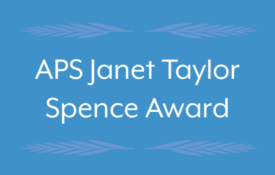-
Beat the Burnout: How to Fight Pandemic Fatigue with Science
Winter can suck the wind from our sails in the best of years, but this is not just any winter – it’s a pandemic winter. This doesn’t necessarily mean it will be worse than ever. Life can be gloriously contrary and you might end up having a pleasant, cosy time. But there’s no denying that, even among those who aren’t grieving or recovering from infection, COVID burnout is real and as contagious as the virus itself. No one should beat themselves up about feeling fatigued right now. Burnout was already doing a swift trade before the pandemic came along, steadily spreading as technology allowed everyone to carry their inboxes in their pockets.
-
It’s Time for Police to Stop Lying to Suspects
Author/APS Member: Saul Kassin Most Americans don’t know this, but police officers in the United States are permitted by law to outright lie about evidence to suspects they interrogate in pursuit of a confession. Of all forms of subterfuge they deploy — like feigning sympathy and suggesting that a suspect’s confession might bring leniency — this one is particularly dangerous. In Frazier v. Cupp (1969), the Supreme Court made it lawful for the police to present false evidence. “The victim’s blood was found on your pillow,” “You failed the polygraph,” “Your fingerprints were on the knife” and “Your friend said she wasn’t with you like you said” are some common but brazen lies told.
-

Training to Wisely Navigate Social Conflicts
People are able to approach social conflicts more wisely if they have trained themselves in advance by practicing a distanced self-talk technique.
-

Training to Wisely Navigate Social Conflicts
People are able to approach social conflicts more wisely if they have trained themselves in advance by practicing a distanced self-talk technique, referring to themselves with third-person pronouns such as “she” or “they” rather than the first-person pronouns of “me” or “I.”
-

Seven Psychological Scientists Receive 2021 APS Janet Taylor Spence Award for Transformative Early-Career Contributions
Seven psychological scientists have been selected as the recipients of the 2021 APS Janet Taylor Spence Award.
-
How Poverty Makes Workers Less Productive
As Washington debates sending checks to Americans and increasing the minimum wage, a new study offers evidence for how such policies could help eliminate poverty. Obviously, giving more money to people without much money helps them with money problems. But the study adds to a growing body of research that says that money really does help workers earn more money. Sendhil Mullainathan is a behavioral economist at the University of Chicago Booth School of Business, and he outlined early evidence for this theory in Scarcity: Why Having Too Little Means So Much, co-authored with Princeton psychologist Eldar Shafir.

